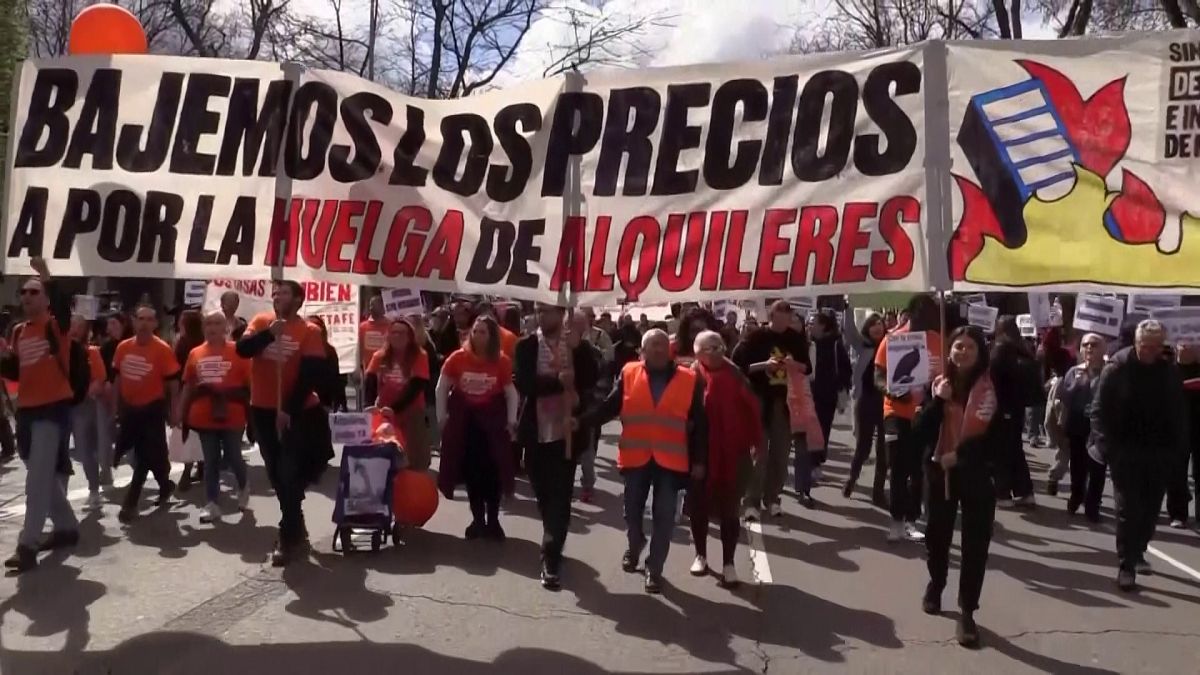Thousands of protesters have taken to the streets across 40 cities in Spain to demand solutions to what they have called the country’s worsening housing crisis.
Organisers of the demonstrations— a collection of tenants’ rights, neighbourhood movements and other social rights groups — accuse the government of turning housing “into a business model.”
“Fear has changed sides: we are not going to demand more changes; we are organised and we have a plan against rentierism”, said one of the groups leading the protests.
The mass protests mark a milestone as they are the first to be held simultaneously in many locations, a decade after the mass protests against evictions.
Major streets across Spain, including the capital, Madrid, on Saturday turned orange and green – the distinctive colours of the movement.
“This demonstration comes after many months of talks; we wanted it to be decentralised, for everyone to come out at the same time and paralyse the state. The idea is that it will be the first day of a new wave of protests,” one of the protesters said.
Some of the demands of the protesters include the immediate lowering of rental prices with a reduction of up to 50%, the revamping of 3.8 million vacant homes, and the prohibition of evictions of vulnerable families.
Sparked by protests in the Canary Islands
The mass mobilisation against the housing crisis first began last year in the Canary Islands, where residents took to the streets to demand a “sustainable” tourism model and denounce the lack of housing solutions.
“Housing has become a luxury within the reach of very few families,” the Tenerife Tenants’ Union said.
Subsequently, the initiative was supported by Malaga with its slogan, “Malaga to live, not to survive,”. It was then followed by Madrid, Barcelona, Valencia, and Bilbao, among other cities.
According to Spain’s tenants’ associations and collectives, the housing situation has reached critical levels, with rents reported to have increased by more than 18% in the last two years.
In some touristic areas, such as Ibiza, rental prices in many cases exceed 100% of the usual salary, while in others, such as Cáceres, “rents have risen last year by 17% in the city and by 27% at the provincial level.”
Mass tourism and real estate speculation
Rents in Spain have doubled in the last ten years due to the country’s history of real estate speculation and the lack of new and completed affordable housing.
“The city model is commodified, expelling the neighbourhood, because the tourism industry exploits our neighbourhoods”, a group called ‘València no està en Venda’ (Valencia is not for sale) lamented.
In regions such as the Canary Islands and the Balearic Islands, the situation is particularly serious due to geographical limitations and tourist pressure.
“We are facing an unprecedented housing emergency: evictions, unaffordable rents, and speculation with housing while the population cannot access this basic right,” the Canarian collectives warned in January.
Organisers of Saturday’s protests say they are confident the nationwide demonstrations will make a significant impact in the struggle for the right to decent, affordable, and sustainable housing in Spain.
According to the Spanish government, at least 600,000 more apartments are needed to address the situation, which it refers to as “a social emergency.”

